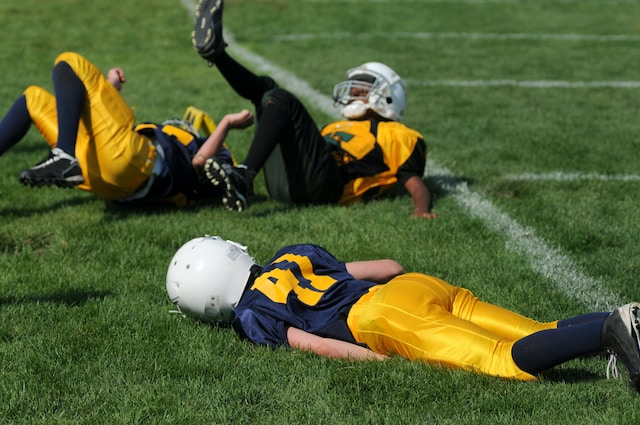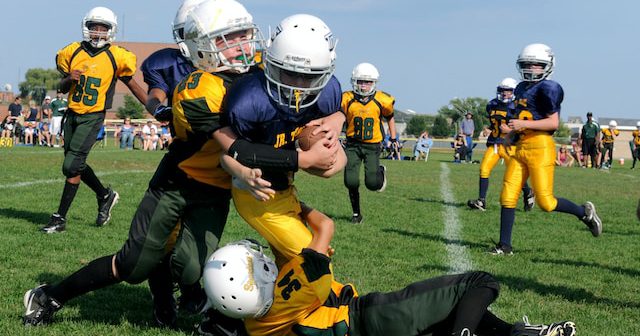Photo by Ben Hershey on Unsplash
While we’ve always known that football is a brutal sport (it isn’t a joke when the men on the gridiron get compared to Roman gladiators as they put their bodies on the line in pursuit of athletic glory), our understanding of the game’s long term impacts has changed dramatically over the past couple decades thanks to advances in the study of neuroscience and the discovery of Chronic Traumatic Encephalopathy (CTE), the degenerative neurological disorder caused by repeated head trauma.
A History of Concussion Treatment
Traumatic brain injuries were once considered nothing more than a minor annoyance: in an era before surgical advances made soft tissue injuries like ACL tears a routine repair, concussions were all too often swept under the rug. A top athlete would obviously struggle to play with a bum knee, keeping them out of the game, but many trainers and players alike looked at brain trauma as something one could bounce back from immediately as it wouldn’t directly limit athletic performance.
Pittsburgh Steelers’ center Mike Webster, one of the iconic members of the franchise’s 1970s dynasty, died a broken man at age 50 in 2002, often homeless and living out of his truck as he suffered from a host of mental illnesses like dementia, amnesia, and depression. A post-mortem autopsy of his brain made Webster the first former NFL player diagnosed with CTE.
Despite Webster’s harrowing tale, he never complained of the effects of the repeated blows to the head he endured (nor received treatment for such injuries) during his playing career.
The diagnosis came as a shock for many, kicking off the current era of increased knowledge about the terrible disease as more and more players suffer from the mental health effects of repeated head trauma, more and more NFL veterans declare their wish to donate their brains to science once they die in order to help doctors learn more about CTE or figure out how to treat it.

Photo by By Boston University Center for the Study of Traumatic Encephalopathy
Here in Massachusetts, nearly half the players who took part in the New England Patriots’ first dynastic run in the early 2000s have reported enduring symptoms stemming from brain injuries following the conclusion of their careers. On the face of it, the discovery of CTE, and with it, the knowledge that playing football can literally kill the people who play it—or at least drastically reduce their lifespans and quality of life—seems like a massive public relations crisis for the NFL.
Even with the added information and increase in concussions, the NFL continues to grow in popularity. Even on the international level as the NFL continues to expand and add more games internationally. Here at home NFL fans, more specifically Patriots fans can take advantage of FanDuel Massachusetts promo codes will come in handy this NFL season if you’re looking to support the Patriots or get in on any NFL action.
What are the Risks?

Photo by Ben Hershey on Unsplash
The problem is that we don’t quite know. CTE can only be diagnosed via autopsy after an athlete dies, so it will take decades (or, at least, an updated method of diagnosis) to learn more about the disease.
What we do know, though, is that no level of tackle football is entirely devoid of risk, as former players who stopped playing the sport as young as Pop Warner or high school have been diagnosed with CTE.
Study of the prevalence of CTE is prone to selection bias, as former athletes who suffer from neurological symptoms following their playing careers are more likely to donate their brains to science than an athlete who manages to stay relatively healthy do: while the numbers look harrowing, studies could make the danger seem worse than it actually is.
That’s an extremely risky bet to take, though, especially when your child’s health hangs in the balance.
What To Do? The Parent’s Perspective
From my point of view, tackle football is simply too dangerous of a game for kids of any age to play, especially when there are plenty of alternative sports available.
If your child is dead set on setting foot on the gridiron, suggest a form of the sport that reduces or eliminates collisions from the game like flag football. Otherwise, sports like soccer, basketball, and baseball all have far fewer violent collisions than football does (and if your child dreams of becoming a professional athlete someday, they can rest assured knowing they’ll make just as much money as stars of another sport).
If you still want to let your child play football after weighing the risks that the sport contains (or if your kid is already playing), I’d recommend a short leash when it comes to head injuries. We still don’t know what threshold of head trauma an athlete can take before developing CTE, so if your child gets even one concussion or complains of sub-concussive hits like “getting their bell rung,” I’d advise pulling them from collision sports like football or ice hockey immediately.
It’s a hard line to take, but long-term neurological health is more important than fleeting glory on the gridiron.





While it is evident that a top athlete would find it difficult to play with a bad knee, keeping them out of the game, many trainers and players believed that one might recover quickly from brain trauma because it wouldn’t directly affect athletic performance.
Deciding whether to let your kids play Pop Warner Football involves considering factors like safety, the child’s interest, physical fitness, and time commitment. Weigh the risks of injuries and concussions against your child’s passion for the sport and ensure they are in good physical condition to download it and have fun.
Explore alternatives and assess the impact on their mental and emotional well-being. Choose an organization with a supportive environment and values aligned with your child’s long-term goals. Seek advice from healthcare professionals, coaches, and other parents involved in the program to make an informed decision that prioritizes your child’s well-being and enjoyment which you can check here Com2uS Studios.
Where can I bet on football?
Do you like to bet on football? If you want to bet on football in a good bookmaker, then follow this link https://melbet.org. In this bookmaker you will be able to bet on different football matches from different leagues, so follow the link above and register with this bookmaker shop for betting on different football matches and winning money on this
Lately I noticed that I often have a situation where I want to make more bets than usual in order to ‘recoup’. How do you manage this desire and how do you avoid the potential risks associated with excessive betting activity? I will be grateful for your advice!
I have long been thinking about what would make my own account on the bookmaker’s website, because I found this link for 1xbet login and registration, 1xbet register online. I already know how betting works, because I helped my friends to bet on sports, so this is not a new activity for me. I am writing this message to wish you good luck. I hope my bets will be successful.
Saffron, a spice as ancient as time, is often dubbed the ‘Crimson Gold’. While traditional bazaars have long been the go-to for this treasured spice, the digital age presents a modern marketplace teeming with options. But, how does one sift through the online clutter to find genuine, top-tier saffron? Here’s your compass for navigating the vast e-commerce seas to unearth the best saffron.